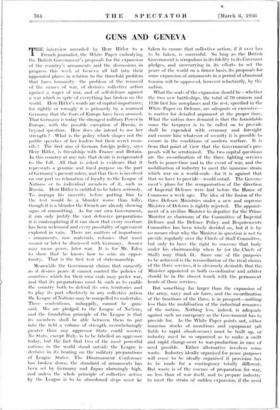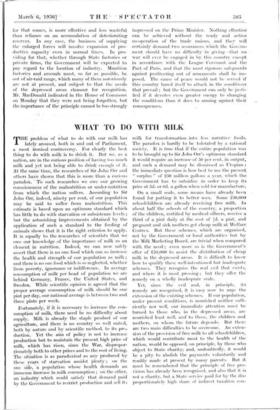GUNS AND GENEVA
THE interview accorded by Herr Hitler to a French journalist, the White Paper embodying the British Government's proposals for the expansion of the country's armaments and the discussions in progress this week at Geneva all fall into their appointed places in relation to the threefold problem that faces humanity—the problem of the removal of the causes of war, of decisive collective action against a wager of war, and of self-defence against a war which in spite of everything has broken on the • world. Herr Hitler's words arc of capital importance, for rightly or wrongly it is primarily by a rearmed Germany that the fears of Europe have been aroused. That Germany is today the strongest military Power in Europe, with the possible exception of Russia, is beyond question. How does she intend to use her- strength ? What is the policy which shapes- not the public speeches of her leaders but their secret coun-. cils ? The first aim of German foreign policy, says Herr 'Hitler, is friendship with France and Britain. In this country at any rate that desire is reciprocated to the full. All that is asked is evidence that it represents a genuine and fixed purpose on the part of Germany's present rulers, and that there is involved on our part no relaxation of loyalty to the League of Nations or to individual members of it, such as Russia. Herr Hitler is entitled to be taken seriously. To impugn his sincerity before putting him to the test would be a blunder worse than folly, though it is a blunder the French are already showing signs of committing. As for our own Government, it can only justify the vast defensive preparations it is contemplating if it can show that every overture has been welcomed and every possibility of agreement- explored in vain. There arc matters of importance --armaments, raw materials, colonies—that must sooner or later be 'discussed with Germany. Sooner may mean peace, later war. It is for Mr. Eden to show that he knows how to seize an oppor- tunity. That is the first test of statesmanship.
Meanwhile the Government claims that earnestly as it desires peace it cannot control the policies of countries which for their own ends may prefer war, and that its preparations must be such. as to enable the country both to defend its own territories and to play its part effectively in any collective action the League of Nations may be compelled to undertake. Those contentions, unhappily, cannot be gain- said. We arc pledged to the League of Nations, and the foundation principle of the League is that its members shall be able between them to put into the field a volume of strength overwhelmingly greater than any aggressor State could muster. No State, except Italy, is to be labelled an aggressor today, but the fact that two of the most powerful nations in the world stand outside the League is decisive in its bearing on the military preparations of League States. The Disarmament Conference has broken down, the standard of armaments has been set by Germany and Japan alarmingly high, and unless the whole principle of collective action by the League is to be abandoned steps must be taken to ensure that collective action, if it ever has to be taken, is successful. So long as the British Government is scrupulous in its fidelity to its Covenant pledges, and unwearying in its efforts to set the peace of the world on a firmer basis, its proposals for some expansion of armaments in a period of abnormal tension will be approved, however reluctantly, by the nation.
What the scale of the expansion should be—whether the two new battleships, the total of 70 cruisers and 1750 first line aeroplanes and the rest, specified in the White Paper on Defence, arc adequate or excessive— is matter for detailed argument at the proper time. What the nation does demand is that the formidable sums the taxpayer is to. be called on to provide shall be expended with economy and foresight and ensure him whatever of security it is possible to ensure in the conditions of modern warfare. It is from that point of view that the Government's pro- posals will be scrutinised. The two capital questions are the co-ordination of the three fighting services both in peace-time and in the event of war, and the mobilisation of industry to meet the immense strain .which war on a world-scale—for it is against that that we have to provide—would entail. The Govern- ment's plans for the reorganisation of the direction of Imperial Defence were laid before the House of Commons a week ago. The idea of the fusion of the three Defence Ministries under a new and supreme Minister of Defence is rightly rejected. The appoint- ment of a civilian Minister to deputise for the Prime Minister as chairman of the Committee of Imperial Defence and the Defence Policy and Requirements. Committee has been wisely decided on, but it is by no means clear why the Minister in question is not to preside regularly over the Chiefs of Staff Committee, but only to have the right to convene that body under his chairmanship when he (or the Chiefs of Staff) may think fit. Since one of the purposes to be achieved is the reconciliation of the rival claims of the three services, it is obviously desirable that the. Minister appointed as both co-ordinator and arbiter should he in the closest touch with the permanent heads of those services.
But something far larger than the expansion of the army, navy and air force, and the co-ordination of the functions of the three, is in prospect—nothing less than the mobilisation of the industrial resources of the nation. Nothing less, indeed, is adequate against such an emergency as the Government has to provide for. As the White Paper points out, either immense stocks of munitions and equipment (all liable to rapid obsolescence) must be built up, or industry must be so organised as to make a swift. and rapid change-over to war-production in case of need possible. Either alternative involves some waste. Industry ideally organised for peace purposes will cease to be ideally organised if provision has to be made for a contingency totally different. But waste is of the essence of preparation .for war, no less than of war itself, and to .prepare industry_ to meet the strain of sudden expansion, if the need. for that comes, is more effective and less wasteful than reliance on an accumulation of deteriorating reserves. In any case, the business of supplying the enlarged forces will involve expansion of pro- ductive capacity even in normal times. In pro- viding_ for_ that, whether through State factories or private firms, the Government will be expected te. pay regard to the location of industry. Munition factories and, arsenals must, so far as possible, be_ out of air-raid range, hich many of them notoriously arc not at present, and subject to that the needs of the depressed areas clamour for recognition, Mr. MacDonald indicated in the House of Commons on Monday that they were not being forgotten, but the imPortance of the principle cannot be too strongly impressed on the Prime Minister. Nothing effective can :be achieved without the ready and active co-operation of the trade unions, and they will certainly demand two assurances which the Govcrn, ment should have no difficulty in giving—that no war will ever be engaged in by this country except in accordance with the League Covenant and the Pact of Paris, and that the most rigorous safeguards against profiteering .out. of armaments shall be im- posed. The cause of peace would not be served if this country bared itself to attack in the conditions that prevail ; but the Government can only be justi- fied if it devotes even greater energy to changing. the conditions than it does to. arming against their consequences.

















































 Previous page
Previous page